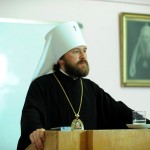by Metropolitan Hilarion Alfeyev
 Lecture delivered at the Kiev Theological Academy on September 20, 2002
Lecture delivered at the Kiev Theological Academy on September 20, 2002
All of our liturgical hymns are instructive, profound and sublime.
They contain the whole of our theology and moral teaching,
give us Christian consolation and instill in us a fear of the Judgment.
He who listens to them attentively has no need of other books on the Faith.St Theophan the Recluse
In this lecture I would like to share with you some thoughts that I have been gathering over my more than 20 years’ participation in Orthodox divine services, both in Russia and abroad. What I have to say will be addressed primarily to ordained ministers and to future clergymen more than to lay people, since I scarcely have any recollections of myself as a layman, and all of my conscious church life has been connected with serving the altar.
As a fifteen-year old boy I first entered the sanctuary of the Lord, the Holy of Holies of the Orthodox Church, and from that time became an active participant in the divine services. Although I had regularly attended church beforehand, listened to the words of the services, confessed, and received Holy Communion, it was only after my entrance into the altar that the theourgia, the mystery, and “feast of faith” began, which continues to this very day. After my ordination, I saw my destiny and main calling in serving the Divine Liturgy. Indeed, everything else, such as sermons, pastoral care and theological scholarship were centered around the main focal point of my life – the Liturgy.
The school of Orthodox theology that formed my theological thinking was not so much a theological seminary, academy or university but the Liturgy and other services. The liturgical texts of the Orthodox Church penetrated my mind and heart so deeply that they became, along with the Gospel and the writings of the church Fathers, the main criteria of theological truth, an inexhaustible source of knowledge about God, Christ, the world, Church and salvation.
Orthodox divine services are a priceless treasure that we must carefully guard. Similar services were once celebrated in other Christian communities, but over the centuries they were lost as a result of both liturgical and theological reforms.
I have had the opportunity to be present at both Protestant and Catholic services, which were, with rare exceptions, quite disappointing. Protestant services as a rule are comprised of a series of isolated, incoherent prayerful actions. At first the officiating clergyman (or clergywoman) says a benediction, then everybody opens a hymnal to a certain page and begins to sing. After a pause the clergyman reads a passage from Scripture, then gives a sermon, followed by communal singing, organ playing, etc. The congregation is usually seated, now and then standing in order to sit down again after some time. The services are interspersed with explanations by the clergy, who tell their congregation in which hymnal and on which page a certain hymn is to be found, and whether they should sing it while standing or remaining seated. Such services do not normally last longer than thirty or forty minutes, and in certain parishes even rock music is used, to which the parishioners dance.
One can add that after the liturgical reforms of the Second Vatican Council, services in some Catholic churches have become little different from Protestant ones. They often share the same lack of wholeness and the same alternation of incoherent, unrelated prayers and hymns.
The liturgical texts used in many non-Orthodox churches, except for the Eucharistic prayers and certain ancient hymns still in use, are often characterized by a low level of theological content: as a rule they contain much “piety” that often borders on the sentimental, and very little theology.
Orthodox divine services, whether it be the Liturgy, vespers, matins, hours, nocturnes or compline, are a totally different matter. From the priest’s exclamation at the very beginning of the service we are immersed in an atmosphere of uninterrupted prayer, in which psalms, litanies, stichera, troparia, prayers and the celebrating priest’s invocations follow one another in a continuous stream. The entire service is conducted as if in one breath, in one rhythm, like an ever unfolding mystery in which nothing distracts from prayer. Byzantine liturgical texts filled with profound theological and mystical content, alternate with the prayerful incantation of the psalms, whose every word resonates in the hearts of the faithful. Even the elements of “choreography” characteristic of Orthodox services, such as solemn entries and exits, prostrations and censing, are not intended to distract from prayer but, on the contrary, to put the faithful in a prayerful disposition and draw them into the theourgia in which, according to the teaching of the Fathers, not only the Church on earth, but also the heavenly Church and even te angels participate.
